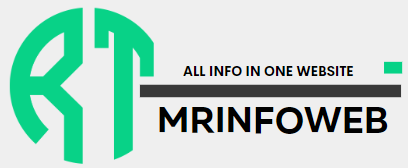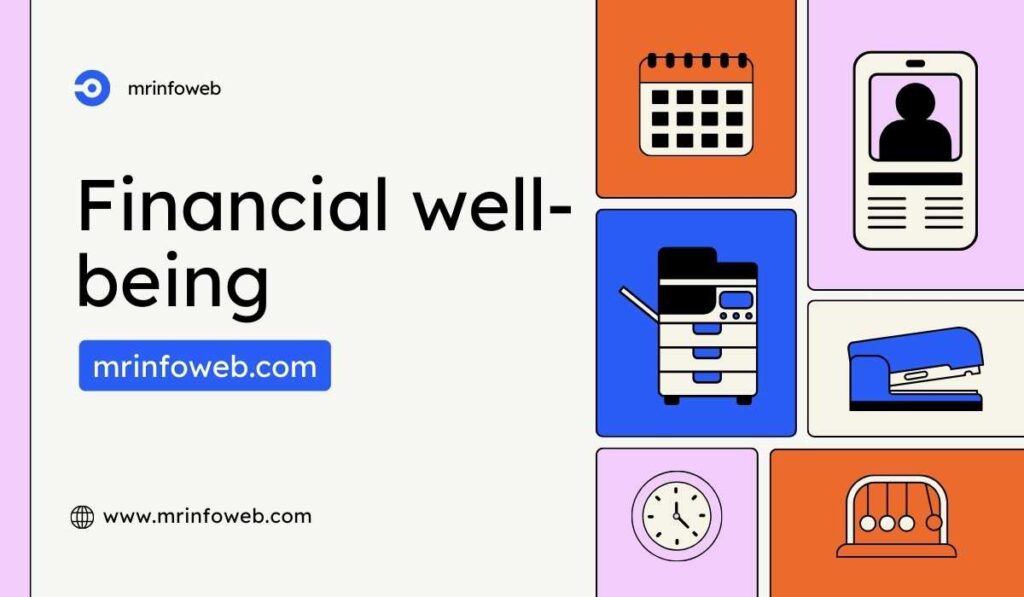Financial well-being is essential for personal security and stress reduction. It enables individuals to meet emergencies and achieve long-term goals with confidence.
Achieving financial well-being is the key to a peaceful and secure lifestyle. It’s about having control over daily finances while paving the way for a stable future, where emergency funds and retirement savings aren’t sources of anxiety.
People with robust financial health can make choices that allow them to enjoy life more fully, without the looming fear of debt or the stress of living paycheck to paycheck.
By managing funds wisely, setting realistic goals, and educating oneself about money management, a foundation of financial wellness is built. This foundation not only affects individual peace of mind but also impacts broader economic stability.
Starting on the path to financial well-being today can open doors to opportunities and contentment tomorrow, making its pursuit a vital endeavor for everyone.

Exploring Financial Well-being
Welcome to the journey of understanding financial well-being. A solid grasp of financial health is crucial. It can lead to peace of mind and lifestyle comfort. Let’s dive in!
Defining Financial Health
What is financial health? It is more than just having money. It’s about the state of your financial life. Financial health means different things to different people. For some, it may mean being debt-free. For others, it could mean having enough savings for life’s surprises.
Think of financial health as a snapshot of your money situation. It includes different parts of your financial life. These parts are like pieces of a puzzle.
Key Components Of Financial Well-being
Understanding key components helps us achieve financial well-being.
- Savings: Money set aside for short-term and long-term goals
- Income: Money earned from work or investments
- Expenses: Monthly bills and costs
- Debt: Money owed to others
- Investments: Money growth over time
- Protection: Insurance to safeguard finances
Each part plays a role in your overall financial picture. A healthy balance between these areas leads to financial well-being.
Let’s remember, that good financial health is possible for everyone. Start with small steps. Track expenses or create a budget. Build an emergency fund. Pay down debt. These actions create a strong foundation.
Psychological Impacts Of Financial Security
Money does more than just pay bills. It brings peace and stability. People with financial security enjoy many benefits. They feel happier and more relaxed. Secure finances mean fewer worries about food, shelter, and other needs.
Stress Reduction And Mental Health
Money worries can create stress. Stress can lead to health problems. With financial security, stress levels drop. People sleep better. They feel more in control of their lives. A calmer mind lets us enjoy every day.
- Better sleep quality
- Less anxiety and depression
- Lower risk of stress-related illnesses
Confidence And Self-esteem
Having money also boosts confidence. People who feel financially secure are more likely to take risks. They are bolder in decision-making. They feel good about their abilities. Financial stability gives a sense of pride and accomplishment.
- Improved ability to make life-changing decisions
- Increased willingness to set and pursue goals
- Higher overall life satisfaction

Relationship Between Financial And Physical Health
The link between financial and physical health is undeniable. Funds impact wellness choices. A stable economic status paves the way for a healthier life. Conversely, financial stress can harm one’s health. Understanding this connection helps in nurturing both aspects effectively.
Healthcare Access And Preventative Care
Money matters in health care. Greater wealth allows for regular doctor visits and timely treatments. Those with strong financial health often enjoy more options for care. They can access top-tier hospitals and specialists. Let’s explore further:
- Insurance Coverage: Financial stability often brings better insurance. This results in decreased health expenses.
- Preventative Measures: With good finances, one can afford vaccines and regular check-ups.
Good finances lead to proactive healthcare behavior. This can prevent severe diseases in the long run. It can reduce the necessity of costly medical interventions later.
Lifestyle Choices And Longevity
Financial well-being influences living habits. It affects diet, exercise, and stress levels.
| Financial Status | Lifestyle Impacts |
|---|---|
| Stable Finances | Quality food, gym memberships, holistic activities. |
| Limited Funds | May lead to cheap nutrition-poor food, sedentary lifestyle. |
Financial resilience opens the door to a longer life. It provides the freedom to make choices that enhance well-being. Investments in health today can increase lifespan and health span.
Achieving Financial Stability
Achieving Financial Stability stands as one of the pillars of a secure and content life. The journey toward this goal encompasses a range of strategies and habits that ensure individuals can meet their financial obligations, save for the future, and withstand economic uncertainties.
With commitment and the right tools, gaining control over finances becomes less of an uphill battle and more a rewarding path to peace of mind and overall well-being.
Budgeting And Expense Tracking
Budgeting lays the foundation for financial stability. It’s like a roadmap guiding you toward your economic goals. Crafting a budget involves knowing your income and expenses in detail.
This knowledge lets you make informed decisions, prioritizing essential spending and cutting back on non-essentials.
- Identify all sources of income: wages, rents, dividends.
- List fixed and variable expenses: bills, groceries, entertainment.
- Set saving goals: an emergency fund, retirement savings, vacation plans.
- Review regularly: Adjust for changes in income or expenses.
Tools such as apps and spreadsheets simplify expense tracking and help spot spending patterns. This allows you to adjust your habits accordingly.
Debt Management Strategies
Handling debt wisely is essential. Effective strategies for managing debt relieve financial pressure and pave the way towards a debt-free life.
- Assess your debts: Gather details on all debts, interest rates, and payment deadlines.
- Create a repayment plan: Consider the debt snowball or avalanche methods.
- Consolidate: Combining multiple debts into one can lead to lower interest rates.
- Seek professional advice: Credit counselors can offer personalized plans.
Staying on top of debts means fewer worries and more financial freedom. Consistency and discipline are your allies in this effort.

Building Wealth Through Smart Investments
Welcome to the crucial topic of Building Wealth Through Smart Investments. This segment aims to enlighten you on how to grow personal wealth.
Wise investment choices can secure financial well-being. Navigating through the myriad investment options effectively paves the pathway to a prosperous future.
Understanding Investment Vehicles
Knowing various investment vehicles forms the foundation of wealth-building. It involves recognizing options that align with financial goals and timelines. Common options include:
- Stocks: Equity shares in companies.
- Bonds: Fixed-income investments.
- Mutual Funds: Pooled funds managed by professionals.
- Exchange-Traded Funds (ETFs): Funds traded on stock exchanges.
- Real Estate: Investing in property.
Select investments that match risk tolerance and return expectations.
Risk Management In Investing
Managing risk is pivotal to protecting investments. It ensures a balanced investment portfolio. Key strategies for risk management include:
- Diversification: Spread investments across various asset classes.
- Regular Review: Assess portfolio performance regularly.
- Investment Horizon: Align investments with long-term objectives.
Diversification is a crucial element, in reducing the impact of market volatility. Ensuring proper risk assessment leads to smart financial decisions.
Creating A Financial Safety Net
Imagine walking on a tightrope with a safety net below. Financial well-being is just like that. The net is your financial safety. It catches you when life throws surprises. This blog section dives into making a strong net. Your money stays safe. You stay stress-free.
Emergency Funds Essentials
Emergency funds are your cash lifelines. They’re your first step in a safety net. When surprises knock, this money answers. Think job loss or medical bills. Here’s how to make this fund work.
- Start small and grow over time.
- Target three to six months’ expenses.
- Keep it accessible but not too easy to spend.
Pro tip: Automate your savings. You’ll build the fund without thinking too much.
Insurance As A Protective Tool
Insurance is your shield in tough times. It’s not just about health. Think car, home, and life too. Here’s what good coverage does:
| Insurance Type | Benefits |
|---|---|
| Health Insurance | Covers medical bills |
| Car Insurance | Pays for accident costs |
| Home Insurance | Protects against damage or theft |
| Life Insurance | Supports your family if you’re gone |
Remember: Choose plans that fit your life. Read the fine print. Peace of mind is worth every penny.
Financial Education As A Tool For Prosperity
Picture your life with total control over your finances. Imagine the peace of mind. That dream starts with financial education. It’s your tool for building a prosperous future.
Knowledge about money helps you make smart choices. It’s not just for the rich. Everyone benefits. Kids, adults, families. Learning about finances can be fun and powerful. Let’s explore how.
Importance Of Continuous Learning
Money matters change fast. New laws, technologies, and markets appear often. To keep up, you must learn all the time. Think of it like a video game. Each level gets harder. But as you learn, you get better.
You make fewer mistakes. You save more. You earn more. It all starts with knowledge. Keeping your financial education up-to-date is key. It opens doors to better jobs and smarter investments.
- Stay ahead of the game: Keep up with financial trends.
- Boost confidence: Know how to manage money well.
- Reduce stress: Be ready for financial ups and downs.
Resources And Programs For Financial Literacy
Many tools exist to help you learn. You can find books, websites, and classes. Some are free. Others might cost a little. Investing in your education pays off. Your local library and schools often have resources. Governments and nonprofits run programs, too. Online courses make learning easy and fun.
| Type of Resource | Benefits | Examples |
|---|---|---|
| Books | Dive deep into topics. | “The Total Money Makeover” |
| Websites | Get the latest info. | Investopedia |
| Classes | Learn with others. | Local community college |
Remember, your journey to financial confidence starts today. Use these tools. Take the first steps. Build a bright, prosperous future.
Empowering Future Generations
Talking about Empowering Future Generations shines a spotlight on how crucial financial well-being is. It’s like planting seeds for trees under which our children will find shade tomorrow.
By giving young ones the tools and knowledge to manage money, we’re setting them up for a future that’s more secure and filled with possibilities. Let’s explore how schools and parents play starring roles in this financial education drama.
Integrating Financial Education In School Curriculum
Schools are powerful places where lifelong lessons begin. Including financial education in the school curriculum is like giving kids a map in the vast world of money matters.
- Math classes can teach about savings and interest.
- Social studies can explore economic systems.
- Projects can include budgeting and smart spending.
By weaving financial concepts through different subjects, schools ensure kids grasp money skills early.
Role Of Parents In Teaching Financial Responsibility
Parents play a key part in teaching kids about money. It starts with simple steps at home.
| Age | Financial Lessons |
|---|---|
| Young Kids | Value of money through chores. |
| Teens | Budgeting with a weekly allowance. |
Open conversations about household finances also help. Kids learn from parents’ habits. Saving together for a family goal can be a fun and valuable lesson.

Barriers To Financial Prosperity And Overcoming Them
Financial well-being is essential. Lack of money knowledge can prevent prosperity. Let’s break those barriers down. We tackle systemic challenges and personal habits. Discover the keys to a sound financial future and take control of your wealth.
Recognizing Systemic Obstacles
Systemic obstacles often feel insurmountable. These include wage gaps, job scarcity, and unequal education access. Knowing these can steer us towards relevant solutions.
- Job market trends
- Education availability
- Wage inequality
Implement these changes to start:
- Seek skills in high demand.
- Advocate for equal education.
- Fight for fair pay.
Personal Habits That Hinder Financial Progress
Personal habits are within our control. We must identify and adjust these promptly. Budget neglect, impulsive spending, and poor saving routines can derail financial goals.
| Bad Habit | Impact | Solution |
|---|---|---|
| Not budgeting | Lost track of finances | Start a monthly budget |
| Impulsive buying | Unnecessary expenses | Wait 48 hours before big purchases |
| Poor saving | No emergency fund | Save a small amount regularly |
Create a plan to transform your finances. Stick to a budget. Resist impulse purchases. Save regularly. Your financial wellness will thank you.
The Social Aspect Of Financial Well-being
Managing money is not just a solo task. It involves our friends, family, and community. Good financial health helps us socialize better and stress less. Support from people around us makes dealing with money easier. Let’s dive into how communities and initiatives can boost our financial wellness.
Community Support Networks
These are groups that help one another with money advice and support. They create a space where sharing and helping is normal. This could mean:
- Swapping skills to save cash
- Money-saving tips from those with experience
- Groups that aid in times of financial need
These networks can be found in places like:
- Local community centers
- Social media
- Non-profit organizations
Financial Inclusion Initiatives
Inclusion means making sure everyone can access financial services. This can help reduce poverty and boost economic activity. Such initiatives include:
| Initiative Type | Brief Description |
|---|---|
| Microfinance | Small loans for those who can’t access traditional banks |
| Digital Payments | Using phones to pay, helping those without bank accounts |
| Financial Literacy Programs | Teaching people how to manage money wisely |
These efforts bring hope and aid to vulnerable groups. They ensure everyone gets a chance to build a brighter financial future.
Frequently Asked Questions For Importance Of Financial Well-being
What Is Financial Well-being?
Financial well-being refers to the state where an individual has achieved a healthy financial life. It is marked by a strong financial foundation where one can manage daily finances, absorb a financial shock, and achieve personal financial goals.
Why Is Financial Well-being Essential?
Financial well-being is essential as it provides peace of mind, reduces stress, and enables you to enjoy your life without financial constraints. It helps in securing your future and allows for financial independence and freedom to make choices that are right for you.
How To Improve Your Financial Well-being?
Improving financial well-being can be achieved by setting a budget, saving regularly, reducing debts, and making informed financial decisions. Education on personal finances and seeking professional advice when necessary can also be beneficial steps toward financial security.
What Impact Does Financial Stress Have?
Financial stress can have a significant impact on one’s mental and physical health, leading to problems such as anxiety, depression, and stress-related illnesses. It can strain relationships, reduce productivity at work, and negatively affect overall life satisfaction.
Conclusion
Embracing financial well-being is pivotal to a stress-free life. It empowers you, fostering security and offering peace of mind. Prioritizing your economic health can transform your future, brightening prospects and cushioning against uncertainty. Start small, plan wisely, and watch your financial resilience grow.
Secure your tomorrow by investing in your financial well-being today.


